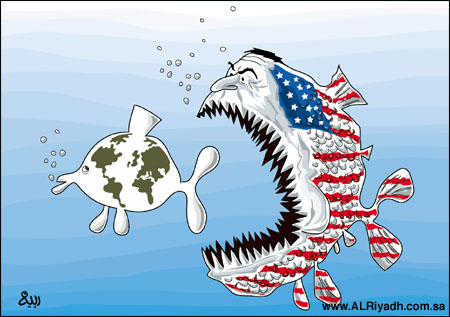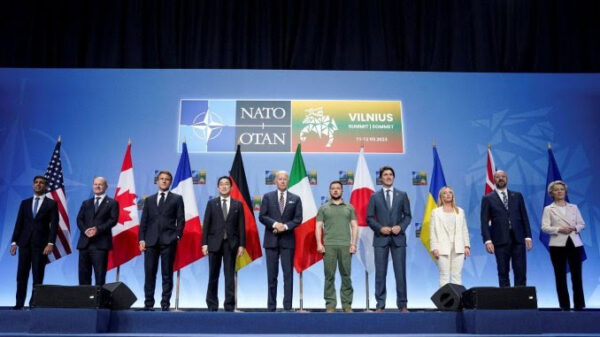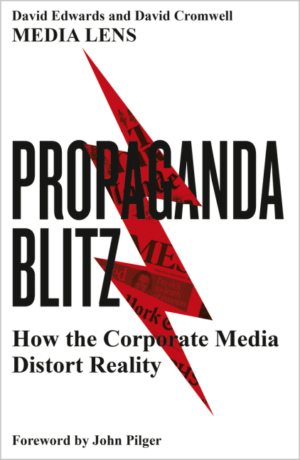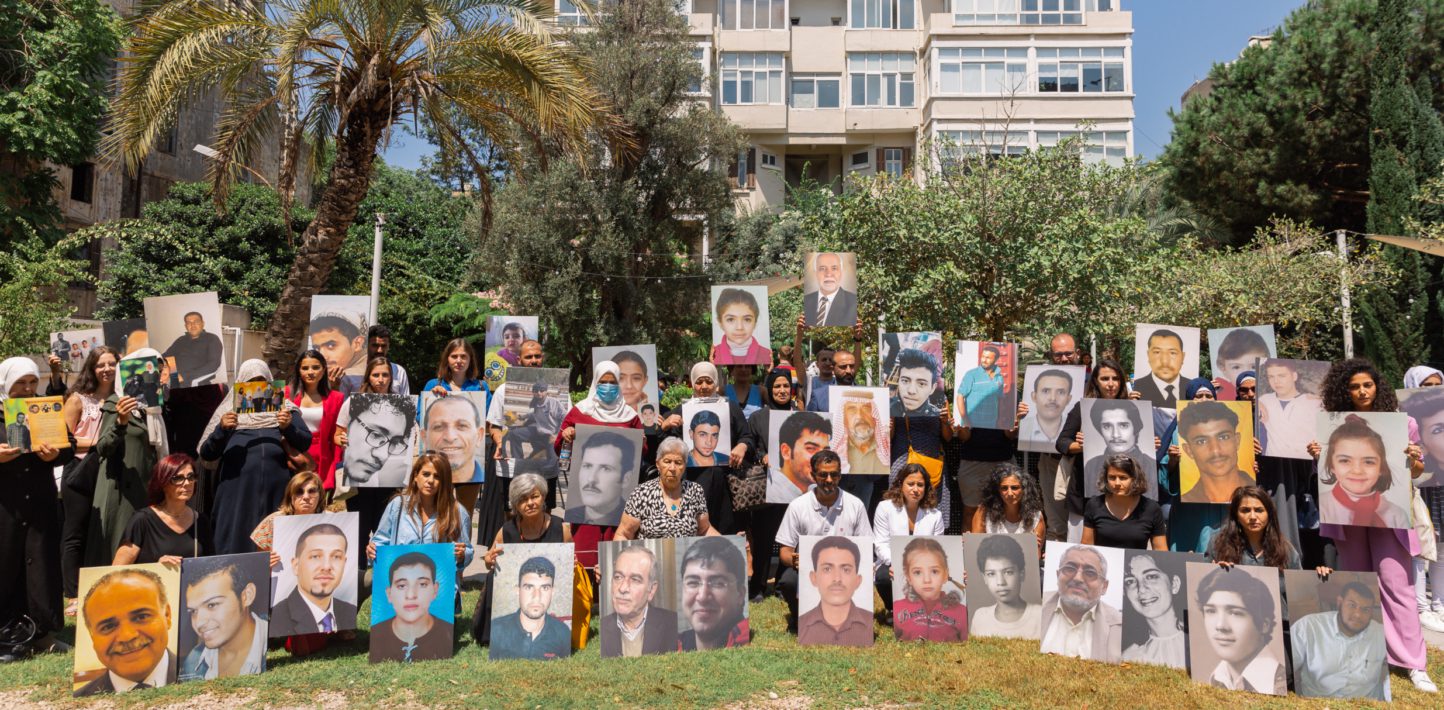It is a historical fact that powerful elites do not wish to be diverted from pursuing their selfish interests by the public. Minimal, unthreatening expressions of dissent may be tolerated in ostensible ‘democracies’. But public opinion needs to be managed, manipulated or, if necessary, simply ignored.
After all, as Noam Chomsky has said, real ‘democracy is a threat to any power system’. He noted that Edward Bernays, one of the founders and leading figures of the huge public relations industry:
reminded his colleagues that with “universal suffrage and universal schooling… even the bourgeoisie stood in fear of the common people. For the masses promised to become king.” That unfortunate tendency could be contained and reversed, he urged, by new methods of “propaganda” that could be used by “intelligent minorities” to “[regiment] the public mind every bit as much as an army regiments the bodies of its soldiers.
(Preface to The Myth of the Liberal Media, Edward S. Herman, Peter Lang Publishing, 1999, pp. x-xi.)
Elite shaping of public opinion is not 100 per cent foolproof, of course, but it is often highly effective. As Peter Beattie, an assistant professor in political economy at the Chinese University of Hong Kong, observed:
‘While the media is far from a brainwashing “influencing machine” or a hypodermic needle capable of injecting ideas into our minds, it is nonetheless the greatest influence on public opinion, as it is the conduit through which the building blocks of public opinion are transported.’
(Beattie, Social Evolution, Political Psychology, and the Media in Democracy: The Invisible Hand in the U.S. Marketplace of Ideas, Palgrave Macmillan, 2019, p. 8)
In fact, one could argue that the media is ‘a brainwashing “influencing machine”’, as demonstrated, for example, by the power and success of the propaganda blitz against Jeremy Corbyn, and the deliberate conflation of antisemitism with anti-Zionism in establishment attempts to smear critics of Israel. However, if public opinion remains stubbornly immune from establishment pressure, it can simply be rejected or overridden.
Consider a YouGov poll last October showing that 66 per cent of the British public support reinstating public ownership of energy companies. Likewise, a 2022 survey by campaign group We Own It revealed that a majority want to see public ownership of utilities such as energy and water.
We Own It director Cat Hobbs said:
Privatisation has failed for nearly 40 years. Politicians can’t ignore the truth any longer: these monopolies are a cash cow for shareholders and we need to take them back.
We need energy companies that don’t rip us off, public transport that works for passengers and water companies that don’t pour sewage into our rivers.’
The poll also showed very strong support for public ownership of buses, the railways, the National Health Service and Royal Mail. These findings were echoed in an Ipsos poll last August.
None of these popular policies are consistent with the extremist, corporate agenda of the Tory government or the ‘opposition’ Labour party. Nor do they feature much in ‘mainstream’ media reporting and commentary. This sums up the reality of British ‘democracy’: a state that suppresses the wishes of the majority and is run for the benefit of a very rich minority.
None of this is unique to the UK; it is an endemic feature of capitalist societies. Justin Lewis, professor of communication at the Cardiff School of Journalism, Media and Culture, wrote that:
Majorities [in the US and other western countries] consistently support increased government spending in traditionally “liberal” areas such as healthcare, education, environmental protection, and even – when the word “welfare” is not used – programs for assisting the poor. This has been well documented in a number of comprehensive studies. And yet the media’s interpretative frameworks tend to suppress the leftist leanings of opinion poll responses, creating a picture of a moderate to conservative citizenry that matches a moderate to conservative political elite.
(Lewis, Constructing Public Opinion: How Political Elites Do What They Like And Why We Seem To Go Along With It, Columbia University Press, 2001, p. 44.)
Of course, the notion that power is held to account by a ‘free press’ in a modern ‘democracy’ is a discredited myth. Patrick Lawrence, formerly a foreign correspondent for many years, chiefly for the International Herald Tribune, noted that the US:
does not have a press by any serious definition of the term. It has a government that, over the course of many decades, has turned the press into an appendage responsible for the manipulation of public opinion.
For instance, US political journalist Glenn Greenwald observed of Ukraine war coverage:
Every word broadcast on CNN or printed in The New York Times about the conflict perfectly aligns with the CIA and Pentagon’s messaging.
Journalists with successful careers in the major Western news media would never dare make such a cogent remark in public. Instead, attention has to be directed towards the propaganda operations of whoever the current ‘Official Enemy’ happens to be. To give just one example: on 27 February 2022, Steve Rosenberg, the BBC’s Moscow correspondent, stood outside the Kremlin and declaimed live on BBC News that evening:
In Russia, television remains the key tool for shaping public opinion. So, if you control TV, as the Kremlin does, you control the messaging. But not 100 per cent, because today many Russians do get their news and information online. And there they see a very different picture.
Likewise, a BBC ‘Live’ webpage about the Ukraine war on 24 February last year included a supposed analysis by Francis Scarr of BBC Monitoring titled, ‘The evolution of Russian propaganda at home’. It began:
A year since the invasion of Ukraine, coverage of the war on Russia’s state-controlled TV channels has shifted as the Kremlin attempts to shape public opinion at home.
Scarr continued:
Two-thirds of Russians receive most of their information from TV, where the messaging is under tight Kremlin control.
What about the ‘tight control’ of government ‘messaging’ via BBC News? It does not necessarily require direct instructions from Whitehall or Downing Street. But senior BBC managers and editors have certainly risen to their positions by thinking the right thoughts and saying the right things.
You will therefore struggle to find a BBC journalist pointing to the disparity between state-mandated BBC News ‘messaging’ and informed sources challenging establishment ideology via non-corporate media. A vanishingly rare exception is Rami Ruhayem, a BBC Arabic and BBC World Service journalist and producer since 2005, who was scathing about the BBC’s coverage of the current phase of the Israeli-Palestinian conflict (see our recent alert). Ruhayem has essentially been ‘disappeared’ with no public response from the BBC and virtually zero coverage in state-corporate media.
Nor will BBC News inform its audiences that government policy is largely determined by the wishes of business elites, as independent studies have shown. Chomsky referred to one of these studies in his 2010 book, ‘Hopes and Prospects’:
In a rare and unusually careful analysis of the domestic influences on U.S. foreign policy, Lawrence Jacobs and Benjamin Page find, unsurprisingly, that the major influence on policy is “internationally oriented business corporations,” though there is also a secondary effect of “experts,” who, they point out “may themselves be influenced by business.” Public opinion, in contrast, has “little or no significant effect on government officials,” they find. (p. 47.)
For example, opinion polling in Germany and France revealed that most people there blame the United States and/or NATO for the war in Ukraine. US political analyst Ben Norton commented:
These results suggest that many average Europeans can see clearly that the conflict in Ukraine is not merely a battle between Kiev and Moscow, but rather a proxy war that the NATO military alliance, led by the United States, is waging against Russia.
Such unacceptable public opinions are dismissed routinely by political leaders. Germany’s hawkish Foreign Minister Annalena Baerbock insisted NATO must ‘stand with Ukraine as long as they need us’, pledging military support ‘no matter what my German voters think’.
Israel’s Claims Against Unrwa: “No Evidence”
Meanwhile, the massive public opposition to Israel’s genocidal attack on Gaza is generating concern at senior levels in western capitals. Dutch prime minister Mark Rutte reportedly even asked the country’s legal affairs ministry:
What can we say to make it look like Israel is not committing war crimes?
Here in the UK, a recent YouGov opinion poll starkly highlighted just how out of step both the Tory government and Sir Keir Starmer’s Labour party are with British public opinion on Israel and Palestine. 66 per cent of Britons believe Israel should stop attacking Gaza and agree to an immediate ceasefire. Only 13 per cent of Britons think Israel should continue with its ‘military action’.
On 20 February, with the death toll in Gaza at almost 30,000, and more than four months after the Israeli carnage began, Labour finally called for ‘an immediate humanitarian ceasefire’, under parliamentary pressure from a Scottish National Party (SNP) motion. However, in the end, a formal vote on a ceasefire did not take place with the Commons debate descending into chaos. There were accusations that the House of Commons Speaker, Sir Lindsay Hoyle, and Starmer had colluded to block Parliament voting on the SNP motion, thus avoiding a mutiny among Labour MPs who have been demanding a less barbaric stance from the Labour leader. SNP Westminster leader Stephen Flynn said:
This should have been the chance for the UK Parliament to do the right thing and vote for an immediate ceasefire in Gaza and Israel – instead it turned into a Westminster circus.
Much of the public, as well as legal experts and informed commentators, regard Israel’s actions in Gaza as genocidal; not least the majority of judges who heard the recent South African case against Israel at the International Court of Justice (ICJ) in the Netherlands.
The cynical and premeditated response of Israel to the ICJ ruling was to make unsubstantiated claims that Unrwa employees, the UN agency which provides relief for six million Palestinian refugees, were involved in the Hamas attacks of 7 October last year. News media, notably including BBC News, gave the claims wall-to-wall coverage. The staff – 12 people out of 13,000 employees – named by Israel were summarily dismissed, without an investigation, by Unrwa. This did not prevent many countries, including the US and the UK, suspending vital humanitarian contributions to the relief agency.
To its credit, Channel 4 News investigated Israel’s allegations and broadcast a report showing that Israel had provided ‘no evidence’ of its claims against the Unrwa staff, other than details identifying the employees alleged to have been involved. As Peter Oborne observed, it appears that, in immediately suspending aid, Britain’s foreign secretary David Cameron had:
jumped to attention solely based on claims made by a government which has long had a strong interest in discrediting Unrwa.
Oborne expanded:
As Israeli television has reported, based on a “high-level classified foreign ministry report”, Israel plans to push Unrwa out of the Gaza Strip.
The plan involves three stages: the publication of a report alleging Unrwa cooperation with Hamas; followed by the promotion of alternative organisations to provide welfare services; and finally, the removal of Unrwa from Gaza altogether.
He continued:
It’s not as if Israel deserves to be automatically believed. The Israeli military has repeatedly been caught out making false and fabricated statements about events in Gaza and elsewhere. This means that every claim emanating from Israel should be treated sceptically. (The same applies, of course, to Hamas.)
Compare this with the UK government’s response to the evidence-based ICJ judgment that Israel is committing genocide in Gaza:
British Prime Minister Rishi Sunak and Cameron trashed the court even before it had reached its judgment, and have continued to do so since.
By contrast, Britain responded at once to allegations regarding Unrwa produced by Israel and suspended funds to the one agency capable of delivering aid in the face of a humanitarian catastrophe.
The huge public protests in the UK, and around the world, highlight the great divide between the public and governments on Israel and Palestine, and wider foreign policy. This has been the case historically.
Establishment Alarm At Public Protest
In February 2003, when a massive global movement attempting to stop the impending Iraq war took to the streets, the New York Times wrote:
The huge anti-war demonstrations around the world this weekend are reminders that there may still be two superpowers on the planet: the United States and world public opinion.
A similar phenomenon is occurring now, with international grassroots pressure demanding an immediate ceasefire in Gaza. But coverage in the state-corporate media does not reflect the power or importance of public protest. As Des Freedman, a professor of media and communications at Goldsmiths, University of London, observed:
Mainstream [sic] media like the BBC will not represent this movement nor hold to account those governments who are complicit in the destruction of Gaza because they are overwhelmingly tied to an imperial world view.
Instead, the BBC and other news media endlessly platform Israeli propaganda, notably the apartheid state’s repeated claims to be ‘defending itself’ in ‘responding’ to the Hamas attacks of 7 October last year.
It is important to emphasise, however, that elite power is not invulnerable to public opinion. In the years following the Iraq war, much of the public came to realise it had been deceived. The US-led invasion-occupation was not about disarming Saddam of mythical ‘weapons of mass destruction’ or about bringing ‘democracy’ to Iraq. It was about oil and western hegemony in the Middle East.
In 2014, a huge 71 per cent of Americans said that the war in Iraq ‘wasn’t worth it’. Likewise, three opinion polls conducted from 1990-2000 found that about 7 in 10 Americans believed that the US war against Vietnam was a ‘mistake’. Many no doubt would have said that the Vietnam war, like the Iraq war, was an international war crime, not merely a ‘mistake’.
On the 20th anniversary of the invasion of Iraq last February, journalist Ian Sinclair published an important analysis in the Morning Star. He pointed out that, although the enormous Stop the War marches did not prevent the war going ahead, or the UK’s participation in it, the anti-war movement did have significant impacts. It helped to inform public opinion and mobilise public action that challenged British foreign policy. Sinclair wrote:
As a politician, Blair was fatally wounded over Iraq, with a 2010 ComRes poll finding 37 per cent of respondents thought he should be put on trial for the invasion.
He added:
The anti-war public mood was also likely a constraining influence on British forces in Iraq. In a 2016 RUSI Journal article, Major General Christopher Elliott noted there was “a cap on numbers, driven by political constraints rather than military necessity.
Milan Rai, editor of Peace News, argued that the UK anti-war movement came close to derailing Britain’s involvement in the Iraq war:
Wobbly Tuesday is one of the great secrets of the Iraq war, kept secret not by state censorship and repression, but by media and academic self-censorship.
‘Wobbly Tuesday’ was Tuesday, 11 March 2003, the date when the British government began to panic that it might lose a parliamentary vote on the war, given the massive public protests. The Sunday Telegraph reported that on that day, Geoff Hoon, the Minister of Defence, was ‘frantically preparing contingency plans to “disconnect” British troops entirely from the military invasion of Iraq, demoting their role to subsequent phases of the campaign and peacekeeping.’ In the end, the government won the Commons vote and the UK shamefully took part in the invasion-occupation of Iraq which led to the deaths of around one million Iraqis.
A 2019 YouGov survey showed that 52 per cent of respondents now oppose British military interventions overseas. This new reality was already evident in August 2013 when MPs voted against a government motion to support planned US air strikes on Syria. Public opinion had been strongly opposed to military action, with a YouGov poll just before the vote showing opposition at 51 per cent, and support at just 22 per cent. This was the first time a British prime minister had lost a vote on war since 1782.
Sinclair observed that:
This defeat generated significant alarm within the Establishment. Speaking two years later, Sir Nick Houghton, Britain’s chief of defence staff, worried “we are experiencing ever greater constraints on our freedom to use force” due to a lack of “societal support, parliamentary consent and ever greater legal challenge.
Julian Assange: Persecuted For Reporting The Truth
One of the biggest establishment campaigns in recent times to manipulate public opinion has been the attempted smearing of WikiLeaks co-founder, Julian Assange, as we have repeatedly highlighted in media alerts (for example, see here and here).
The latest stage of this campaign has been the final High Court hearing in London this week to decide whether Assange will be sent to trial in the US under the 1917 Espionage Act, a first for the prosecution for any journalist or publisher. And all for the supposed ‘offence’ of publishing the truth about US war crimes.
Nina Cross, an investigative reporter for The Indicter website, noted that ‘the defamation of Assange’s character by the British government is institutional’ and that ‘only through the complicity of the corporate media has this abuse been possible.’
She added:
Without its sustained collusion and servility, the powerful would not have impunity; they would not dare attempt what appears to be the slow assassination of a journalist in full public view for exposing their crimes.
Noam Chomsky and Alice Walker pointed out how the media bowed down to the US government’s dictate that they focus on Assange’s personality, and not on the principles of the case:
Assange is not on trial for skateboarding in the Ecuadorian embassy, for tweeting, for calling Hillary Clinton a war hawk, or for having an unkempt beard as he was dragged into detention by British police. Assange faces extradition to the United States because he published incontrovertible proof of war crimes and abuses in Iraq and Afghanistan, embarrassing the most powerful nation on Earth. Assange published hard evidence of “the ways in which the first world exploits the third”, according to whistleblower Chelsea Manning, the source of that evidence. Assange is on trial for his journalism, for his principles, not his personality.
They added:
By drawing attention away from the principles of the case, the obsession with personality pushes out the significance of WikiLeaks’ revelations and the extent to which governments have concealed misconduct from their own citizens. It pushes out how Assange’s 2010 publications exposed 15,000 previously uncounted civilian casualties in Iraq, casualties that the US Army would have buried. It pushes out the fact that the United States is attempting to accomplish what repressive regimes can only dream of: deciding what journalists around the globe can and cannot write. It pushes out the fact that all whistleblowers and journalism itself, not just Assange, is on trial here.
Whatever the outcome of this week’s High Court hearings, the valiant example of Assange and WikiLeaks in exposing power serves as inspiration for what can be achieved through the power of truth, humanity and compassion.
Elite power may, at times, seem overwhelming, bordering on invincible. It is an oft-quoted line, but a vital truth that: ‘We are many and they are few’. At root, elite interests fear public power. Therein lies hope.
The writer Maria Popova highlighted David Byrne, former frontman of Talking Heads, as:
one of the last standing idealists in our world — a countercultural force of lucid and luminous optimism, kindred to Walt Whitman, who wrote so passionately about optimism as a mighty force of resistance and a pillar of democracy.
In ‘One Fine Day’, co-written with Brian Eno, Byrne sings a ‘buoyant hymn of optimism [that] ripples against the current of our time as a mighty countercultural anthem of resistance and resilience.’
The song observes movingly:
Shouts and battle cries, from every part
I can see those tears, every one is true
It concludes on an uplifting note:
Then a peace of mind fell over me —
In these troubled times, I still can see
We can use the stars, to guide the way
It is not that far, the one fine —One fine day
That one fine day is still within our reach.
The post Elite Fear Of The Public: Ukraine, Gaza and Assange first appeared on Dissident Voice.This post was originally published on Dissident Voice.

























